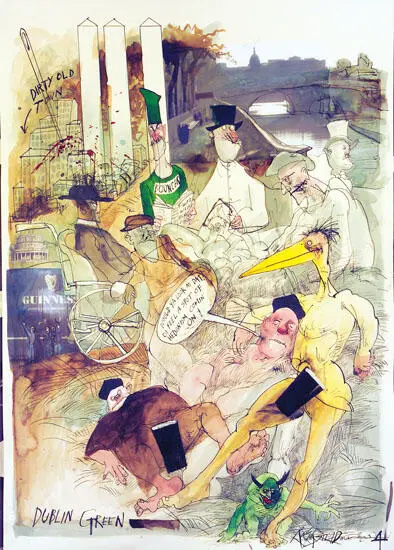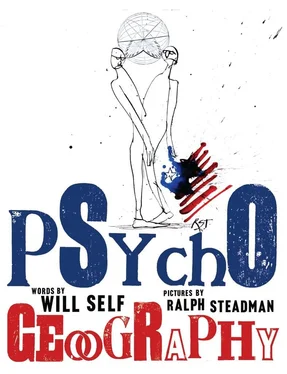Meanwhile, in the Angus Steakhouse international citizens of the salad bar were munching their sirloins and sitting so placidly on their rumps that I felt the Last Trump might not disturb them. The police rallied outside the Porcupine pub on the opposite side of the road, and the drinkers who’d come out to see the action stepped casually to one side, incapable of apprehending the irony that they were standing, glasses in hands, while others were throwing them. It was then that I saw the tall, shaven-headed hipster who only two days earlier had cut my hair in a trendy hairdresser’s, in a basement on Berwick Street Market. Resplendent in a leather car coat, he and a couple of pals had created their own mini-barricade out of some plastic milk crates and were crouched behind it snapping the action through phallic telephoto lenses.
It seemed so just, so very cusp-of-the-1990s, this club-culture civil disturbance with its ecstatic voyeurs, masked class warriors and amiable plods. In due course the whole remorseless farrago moved on up to Tottenham Court Road, where it dissipated in the shattered afterimages of plate glass, and the city resumed its normal state of pathological disregard.
In Dublin the big black Mercedes oozes through the mid-morning traffic. The atmosphere is greenish, submarine, as if the dregs of a gigantic pint of Guinness were being swilled about the Georgian terraces and squares. I haven’t been here for seven years, and before that visit not since the early 1980s; this gives me a jump-cut perspective on the city’s mutant growth: the wedges of steely contemporaneity hammered into its crumbling façade are blindingly obvious, whereas if I’d visited more frequently they would’ve insinuated themselves without my noticing.
‘See that,’ says Vivian, the driver, indicating three ten-storey, pyramidically roofed office blocks on the further bank of the Liffey. ‘We call that Canary Dwarf.’
‘That’s right,’ puts in Cormac, my companion, ‘and you see the big spike thing over there. .’ he indicates a seventy-five-metre-high bodkin plunged into the urban pincushion, ‘. . it’s the Millennium Spire. When they were putting it up they had a giant crane sited right in front of Cleary’s, the department store, then when they were finally finished everyone walked round town singing “I can see Cleary’s now the crane is gone”.’
It’s a fitting entry to the westernmost cockpit of European literary modernism, this dinky-ville, in the grip of a painful dialectic between Catholicism and hedonism, and hence preoccupied with dualistic punning. The youthful populace of Dublin are being sucked out of the churches by the ideological vacuum; on to the streets, then into the bars and restaurants which have colonised the city centre. Where once burly men in soutanes enforced the creed, now burly men in black overcoats enforce the guest list. The curly plastic pigs’ tails dangling from their bruised ears presumably allow them to hear the word of the nightclubbing god.

It’s the brink of Ireland’s presidency of the European Union and a cavalcade of pols are in town to jaw-jaw. At the mouth of every side street in the city centre steel barriers have been placed to provide leaning room for Gardai. So every car journey we take — and we take many — proceeds at the stately pace of a sedan chair. ‘There’s roadworks in St Stephen’s Green,’ Vivian vouchsafes. ‘They’re putting in the new light railway line for the Luas.’
‘Luas?’ I query.
‘It means something in Gaelic,’ Cormac interjects, ‘possibly “light”.’
‘Possibly,’ Vivian continues, ‘although most people call it the Lose, because so much bloody money has been spent on the thing.’
Money: this is the true Blarney Stone of Dublin — kiss it and you’ll talk all night. The city is awash with wonga. The old public housing in the centre of town is being siphoned off, and the inhabitants poured into the big housing estates out by the ring road, which Dubliners don’t hesitate to call ‘ghettos’, estates that are also home to black and brown faces. Immigrants to Ireland! The world is turned upside down; a country that’s been sucked dry for four centuries is finally filling up again. Meanwhile, desirable residences are changing hands for astronomical figures: 450,000 euros for a tiny terraced house. Yes, the Eurotrash are in town, and one of the old Dublin city bosses is under judicial investigation — together with his pals — for taking kickbacks from developers going back to the 1960s. It’s a friendly visit from Big Corruption to Little Graft, to show them how it’s done.
Out at the headquarters of RTE they’re shooting First City , the soap opera that keeps the state broadcasting network afloat. In among the anonymous four-storey blocks of knobbly concrete and green-tinted glass, the set is a coruscating notch. Bright lights pick out the frontage of a typical Dublin ’burb: a convenience store, a betting shop, and Phelan’s, the bar that’s the focal point for the drama. ‘The fictional location is called Carrickstown,’ Cormac says, ‘but I’m pretty sure it’s meant to be Crumlindrumagh down on the coast to the south of town.’ It’s a nice architectural prolepsis, this set: the old Dublin community lost in the concrete canyon.
That night we breast the rivers of light that the city streets have become. I remember being here in 1980 when the roadways were dark troughs after 11.00 p.m. Is it my faulty recollection, or were there also horse-drawn carts jolting over the cobbles? Now we sit in an echt eatery, inhaling Thai seafood. The couple beside us pay their bill and leave. ‘See that woman,’ Cormac says. ‘I was at college with her. I kept trying to catch her eye, but the man with her wasn’t her husband.’
‘Yes,’ puts in Peter, a fellow journalist who’s dining with us, ‘ours is the first Irish generation who’ve been able to commit adultery. We have the facilities, we have the opportunities. Still, in a town as small as this you’re mad going to a restaurant.’
‘Mad,’ Cormac muses, contemplating the terrifyingly tiny world of the urban adulterer that Dublin’s been dragged into.
The Hot Spirit of the Caribbean
In Montserrat the hills mounted up to the volcano in a series of green gushes: plantations of bananas and sugar cane were interrupted by the painterly strokes of field terraces. This was a veritable Trevi Fountain of a Caribbean island, with at its summit a burbling fumarole which emitted a sulphurous stench, as the Devil tossed and turned beneath the earth’s crust, farting off his evil business lunch.
I say was, because, of course, since I was there twenty-eight years ago the volcano has blown its top and submerged two-thirds of the island in its fiery dung. Gone is the miniature capital with its dinky colonial buildings, gone are most of the dusty hamlets I remember caroming through with my mother in our hire car; and, while we’re at it, gone as well is my mother. I concede I can’t make too much of this annihilation of a month of my adolescence by an earthy eructation, but there is something peculiarly distancing about the past no longer being another country, but instead a barren land.
I think back to the black volcanic sand beaches of the island that toasted the soles of my feet and can hear the jingle of the local radio station well in my inner ear: ‘Got a feeling deep inside / It’s a feeling I can’t hide / Feel the spirit, feel it! / Feel the spirit of the Ca-ri-bbe-an / Radio Antilles, the big RA!’ It was my mother’s brother, Uncle Bob, who brought us to Montserrat. A one-time bigwig advertising man on Madison Avenue, Bob was responsible for — among many other things — the creation of the Pilsbury Dough Boy. A bakery burnout, followed by a triple heart bypass, drove him into early retirement. He and my aunt lived in a beautiful bungalow in one of the white retirement cantonments that studded the eastern shore of the island.
Читать дальше













